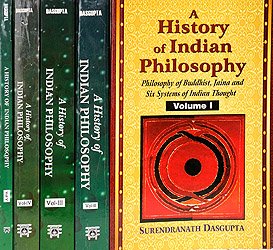A History of Indian Philosophy Volume 1
by Surendranath Dasgupta | 1922 | 212,082 words | ISBN-13: 9788120804081
This page describes the philosophy of the aranyakas: a concept having historical value dating from ancient India. This is the sixth part in the series called the “the vedas, brahmanas and their philosophy”, originally composed by Surendranath Dasgupta in the early 20th century.
Part 6 - The Āraṇyakas
As a further development of the Brāhmaṇas however we get the Āraṇyakas or forest treatises. These works were probably composed for old men who had retired into the forest and were thus unable to perform elaborate sacrifices requiring a multitude of accessories and articles which could not be procured in forests. In these, meditations on certain symbols were supposed to be of great merit, and they gradually began to supplant the sacrifices as being of a superior order. It is here that we find that amongst a certain section of intelligent people the ritualistic ideas began to give way, and philosophic speculations about the nature of truth became gradually substituted in their place. To take an illustration from the beginning of the Bṛhadāranyaka we find that instead of the actual performance of the horse sacrifice (aśvamedha) there are directions for meditating upon the dawn (Uṣas) as the head of the horse, the sun as the eye of the horse, the air as its life, and so on. This is indeed a distinct advancement of the claims of speculation or meditation over the actual performance of the complicated ceremonials of sacrifice.
The growth of the subjective speculation, as being capable of bringing the highest good, gradually resulted in the supersession of Vedic ritualism and the establishment of the claims of philosophic meditation and self-knowledge as the highest goal of life. Thus we find that the Aranyaka age was a period during which free thinking tried gradually to shake off the shackles of ritualism which had fettered it for a long time. It was thus that the Āraṇyakas could pave the way for the Upaniṣads, revive the germs of philosophic speculation in the Vedas, and develop them in a manner which made the Upanisads the source of all philosophy that arose in the world of Hindu thought.
